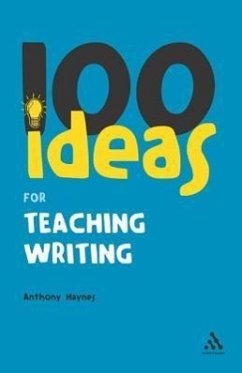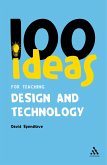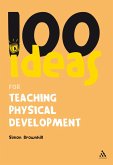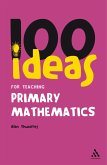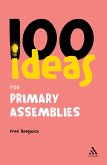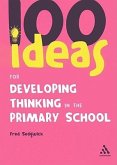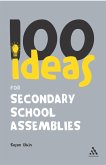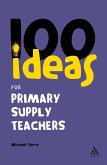Anthony Haynes
100 Ideas for Teaching Writing
24,99 €
inkl. MwSt.
Versandfertig in über 4 Wochen

12 °P sammeln
Anthony Haynes
100 Ideas for Teaching Writing
- Broschiertes Buch
- Merkliste
- Auf die Merkliste
- Bewerten Bewerten
- Teilen
- Produkt teilen
- Produkterinnerung
- Produkterinnerung
The book is full of practical tips including instant lessons, effective resources, and lists of dos and don'ts. Emphasis is put on providing pupils with a sense of purpose, opportunities to write for real and varied audiences, and
Andere Kunden interessierten sich auch für
![100 Ideas for Teaching Design and Technology 100 Ideas for Teaching Design and Technology]() David Spendlove100 Ideas for Teaching Design and Technology26,99 €
David Spendlove100 Ideas for Teaching Design and Technology26,99 €![100 Ideas for Teaching Physical Development 100 Ideas for Teaching Physical Development]() Dr Simon Brownhill100 Ideas for Teaching Physical Development25,99 €
Dr Simon Brownhill100 Ideas for Teaching Physical Development25,99 €![100 Ideas for Teaching Primary Mathematics 100 Ideas for Teaching Primary Mathematics]() Alan Thwaites100 Ideas for Teaching Primary Mathematics30,99 €
Alan Thwaites100 Ideas for Teaching Primary Mathematics30,99 €![100 Ideas for Assemblies: Primary School Edition 100 Ideas for Assemblies: Primary School Edition]() Fred Sedgwick100 Ideas for Assemblies: Primary School Edition31,99 €
Fred Sedgwick100 Ideas for Assemblies: Primary School Edition31,99 €![100 Ideas for Developing Thinking in the Primary School 100 Ideas for Developing Thinking in the Primary School]() Fred Sedgwick100 Ideas for Developing Thinking in the Primary School34,99 €
Fred Sedgwick100 Ideas for Developing Thinking in the Primary School34,99 €![100 Ideas for Secondary School Assemblies 100 Ideas for Secondary School Assemblies]() Susan Elkin100 Ideas for Secondary School Assemblies23,99 €
Susan Elkin100 Ideas for Secondary School Assemblies23,99 €![100 Ideas for Supply Teachers: Primary School Edition 100 Ideas for Supply Teachers: Primary School Edition]() Michael Parry100 Ideas for Supply Teachers: Primary School Edition29,99 €
Michael Parry100 Ideas for Supply Teachers: Primary School Edition29,99 €-
-
-
The book is full of practical tips including instant lessons, effective resources, and lists of dos and don'ts. Emphasis is put on providing pupils with a sense of purpose, opportunities to write for real and varied audiences, and
Hinweis: Dieser Artikel kann nur an eine deutsche Lieferadresse ausgeliefert werden.
Hinweis: Dieser Artikel kann nur an eine deutsche Lieferadresse ausgeliefert werden.
Produktdetails
- Produktdetails
- Verlag: Bloomsbury Academic
- Seitenzahl: 128
- Erscheinungstermin: 10. Mai 2007
- Englisch
- Abmessung: 200mm x 139mm x 10mm
- Gewicht: 145g
- ISBN-13: 9780826483096
- ISBN-10: 0826483097
- Artikelnr.: 22589986
- Herstellerkennzeichnung
- Libri GmbH
- Europaallee 1
- 36244 Bad Hersfeld
- gpsr@libri.de
- Verlag: Bloomsbury Academic
- Seitenzahl: 128
- Erscheinungstermin: 10. Mai 2007
- Englisch
- Abmessung: 200mm x 139mm x 10mm
- Gewicht: 145g
- ISBN-13: 9780826483096
- ISBN-10: 0826483097
- Artikelnr.: 22589986
- Herstellerkennzeichnung
- Libri GmbH
- Europaallee 1
- 36244 Bad Hersfeld
- gpsr@libri.de
Anthony Haynes is former Chair of the English Association schools committee, former faculty co-ordinator and mentor of PGCE students and NQTs.
1. Thinking about writing eg
- place in curriculum
- the writing cycle
- progression (what to do when)
- common abuses
2. Teaching the writing process eg
- Writing roles: the composer and the secretary
- process and product: it's not either/or
- main stages in the process
- writing frames (David Wray)
3. Starting points
- getting ideas
- free-writing
- intensive writing (Margaret Langdon)
- stimuli
4. Drafting and redrafting eg
- Helping pupils to plan
- Responding to drafts
- Proofreading
- presentation
5. Forms and structures eg
- Essays
- Reports
- Narratives
- poetry
6. Writing for different audiences eg
- Who are we writing for? specifying the audience
- The key distinction: personal and impersonal audiences
- Writing for real audiences
- Writing for simulated audiences
7. Technology (handwriting, ICT) eg
- Pens
- physical factors (seating, posture, grip)
- ICT as a stimulus
- ICT and the drafting process: on not starting at the top
8. Spelling eg
- good practice
- bad practice (often well-intentioned and sadly all too common)
- whole school approaches
- children's spelling ages
9. Punctuation eg
- Teaching punctuation marks as road signs
- Showing how punctuation affects meaning
- Speech marks
- Apostrophes
10. Assessment and evaluation eg
- self-assessment by pupils
- establishing symbols for marking
- practical techniques for marking
- what to do with the results
11. Resources eg
- Dictionaries
- Objects in the classroom
- Websites for pupils
books for teacher
- place in curriculum
- the writing cycle
- progression (what to do when)
- common abuses
2. Teaching the writing process eg
- Writing roles: the composer and the secretary
- process and product: it's not either/or
- main stages in the process
- writing frames (David Wray)
3. Starting points
- getting ideas
- free-writing
- intensive writing (Margaret Langdon)
- stimuli
4. Drafting and redrafting eg
- Helping pupils to plan
- Responding to drafts
- Proofreading
- presentation
5. Forms and structures eg
- Essays
- Reports
- Narratives
- poetry
6. Writing for different audiences eg
- Who are we writing for? specifying the audience
- The key distinction: personal and impersonal audiences
- Writing for real audiences
- Writing for simulated audiences
7. Technology (handwriting, ICT) eg
- Pens
- physical factors (seating, posture, grip)
- ICT as a stimulus
- ICT and the drafting process: on not starting at the top
8. Spelling eg
- good practice
- bad practice (often well-intentioned and sadly all too common)
- whole school approaches
- children's spelling ages
9. Punctuation eg
- Teaching punctuation marks as road signs
- Showing how punctuation affects meaning
- Speech marks
- Apostrophes
10. Assessment and evaluation eg
- self-assessment by pupils
- establishing symbols for marking
- practical techniques for marking
- what to do with the results
11. Resources eg
- Dictionaries
- Objects in the classroom
- Websites for pupils
books for teacher
1. Thinking about writing eg
- place in curriculum
- the writing cycle
- progression (what to do when)
- common abuses
2. Teaching the writing process eg
- Writing roles: the composer and the secretary
- process and product: it's not either/or
- main stages in the process
- writing frames (David Wray)
3. Starting points
- getting ideas
- free-writing
- intensive writing (Margaret Langdon)
- stimuli
4. Drafting and redrafting eg
- Helping pupils to plan
- Responding to drafts
- Proofreading
- presentation
5. Forms and structures eg
- Essays
- Reports
- Narratives
- poetry
6. Writing for different audiences eg
- Who are we writing for? specifying the audience
- The key distinction: personal and impersonal audiences
- Writing for real audiences
- Writing for simulated audiences
7. Technology (handwriting, ICT) eg
- Pens
- physical factors (seating, posture, grip)
- ICT as a stimulus
- ICT and the drafting process: on not starting at the top
8. Spelling eg
- good practice
- bad practice (often well-intentioned and sadly all too common)
- whole school approaches
- children's spelling ages
9. Punctuation eg
- Teaching punctuation marks as road signs
- Showing how punctuation affects meaning
- Speech marks
- Apostrophes
10. Assessment and evaluation eg
- self-assessment by pupils
- establishing symbols for marking
- practical techniques for marking
- what to do with the results
11. Resources eg
- Dictionaries
- Objects in the classroom
- Websites for pupils
books for teacher
- place in curriculum
- the writing cycle
- progression (what to do when)
- common abuses
2. Teaching the writing process eg
- Writing roles: the composer and the secretary
- process and product: it's not either/or
- main stages in the process
- writing frames (David Wray)
3. Starting points
- getting ideas
- free-writing
- intensive writing (Margaret Langdon)
- stimuli
4. Drafting and redrafting eg
- Helping pupils to plan
- Responding to drafts
- Proofreading
- presentation
5. Forms and structures eg
- Essays
- Reports
- Narratives
- poetry
6. Writing for different audiences eg
- Who are we writing for? specifying the audience
- The key distinction: personal and impersonal audiences
- Writing for real audiences
- Writing for simulated audiences
7. Technology (handwriting, ICT) eg
- Pens
- physical factors (seating, posture, grip)
- ICT as a stimulus
- ICT and the drafting process: on not starting at the top
8. Spelling eg
- good practice
- bad practice (often well-intentioned and sadly all too common)
- whole school approaches
- children's spelling ages
9. Punctuation eg
- Teaching punctuation marks as road signs
- Showing how punctuation affects meaning
- Speech marks
- Apostrophes
10. Assessment and evaluation eg
- self-assessment by pupils
- establishing symbols for marking
- practical techniques for marking
- what to do with the results
11. Resources eg
- Dictionaries
- Objects in the classroom
- Websites for pupils
books for teacher
